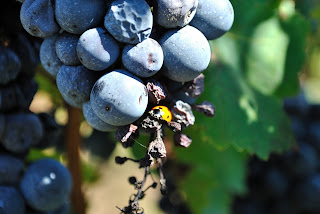Yesterday night, I came back in Apulia after a couple of days in Florence, where I have been at Galleria degli Uffizi contemplating Caravaggio, Piero della Fracesca, Botticelli, Tiziano, Giotto, Mantegna et cetera.
It was 11 o'clock pm, we didn't have dinner yet, so I asked Lucia "Would you fancy pasta alio, olio and peperoncino"?
"Yes, sure" she replies. I'm a lucky man, I know.
I start cooking, meantime, I open a bottle of Elce Primitivo of Poderi delle Mura, run by Vito Calia and his bride.
After having drunk the first glass, I could not refrain from sending a message to Vito "Ciao Vito, sono tornato stasera da Firenze. Ho letto la tua mail ed ho subito colto il tuo invito aprendo una delle bottiglie generosamente donatemi: il tuo vino apre la mente. Il gusto, il sapore dischiudono orizzonti inesplorati. Complimenti!"
The problem you may encounter when drinking such a wine is that you would drink the entire bottle.
Fortunately, Lucia, my wife, calls me from the bed "come to sleep. It's late". So, it came that I drink just half bottle of this fruit juice.
Vito owns a vineyard of just three hectares in Altamura and produce a ruby red Primitivo wine and a White Elce wine (70% Malvasia).

I interviewed Vito a week ago.
I was so curious to know the story behind this wine as it seems that Vito is the only wine maker in Altamura who has decided to promote his wine. Indeed, he's only goal is quality, quality and again quality.
He picks me up at 12.
"Hi Vito, nice to meet you" I say.
"Ciao Antonio, please, get in" he replies.
We head straight to the Vito's vineyard, located at contrada Parisi, Altamura.
"I inherited this vineyard from my dad who died in 2003. I wine-make since I was a kid. I didn't go on holidays in summer because I had to help my dad to look after the vineyard" he says.
He continues "When I grew up, my main job was as estate agent, which I've carried out for 18 years. Then, in 2013, the crisis arrived. I blessed that crisis because finally my wife and I took the decision to became professional winemaker, focusing just on our wines."
I listen to Vito and I realise how genuine he is.
What probably strikes me more is the passion that his words emanate.
He tells me that this year he has decided to make his wine stronger (15% alcohol instead of the past 14%) by sacrificing some quantity and delaying the harvest at the end of September.

Ladybirds seem appreciating it.
"Looking after my vineyard means also defend it from diseases such as peronospora (late blight), which may take place especially in May and June. You know, I plant a rose at the head of each row. Roses work like sentinels when peronospora occurs, because they get sick first, so I'd have the time needed to intervene" Vito adds.
"I'm for a clean agriculture" Vito declares.
"It's seven years that I don't use anymore copper sulphate (vitriol) because I don't want metal flooding the soil" He says.
I invite you to try his wine.
It won't let you down. Guaranteed.
























